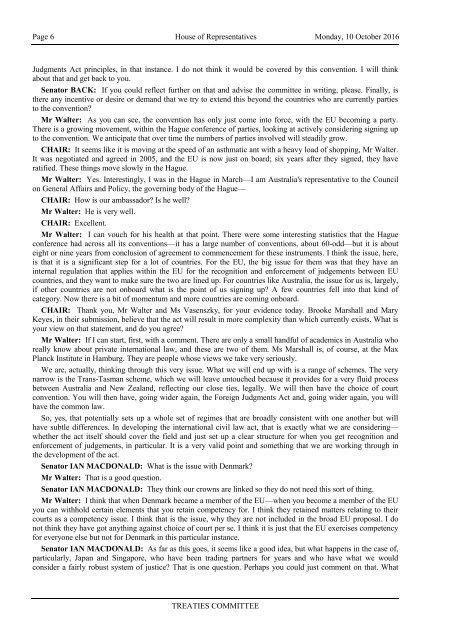Proof Committee Hansard
2d908Ic
2d908Ic
Create successful ePaper yourself
Turn your PDF publications into a flip-book with our unique Google optimized e-Paper software.
Page 6 House of Representatives Monday, 10 October 2016<br />
Judgments Act principles, in that instance. I do not think it would be covered by this convention. I will think<br />
about that and get back to you.<br />
Senator BACK: If you could reflect further on that and advise the committee in writing, please. Finally, is<br />
there any incentive or desire or demand that we try to extend this beyond the countries who are currently parties<br />
to the convention?<br />
Mr Walter: As you can see, the convention has only just come into force, with the EU becoming a party.<br />
There is a growing movement, within the Hague conference of parties, looking at actively considering signing up<br />
to the convention. We anticipate that over time the numbers of parties involved will steadily grow.<br />
CHAIR: It seems like it is moving at the speed of an asthmatic ant with a heavy load of shopping, Mr Walter.<br />
It was negotiated and agreed in 2005, and the EU is now just on board; six years after they signed, they have<br />
ratified. These things move slowly in the Hague.<br />
Mr Walter: Yes. Interestingly, I was in the Hague in March—I am Australia's representative to the Council<br />
on General Affairs and Policy, the governing body of the Hague—<br />
CHAIR: How is our ambassador? Is he well?<br />
Mr Walter: He is very well.<br />
CHAIR: Excellent.<br />
Mr Walter: I can vouch for his health at that point. There were some interesting statistics that the Hague<br />
conference had across all its conventions—it has a large number of conventions, about 60-odd—but it is about<br />
eight or nine years from conclusion of agreement to commencement for these instruments. I think the issue, here,<br />
is that it is a significant step for a lot of countries. For the EU, the big issue for them was that they have an<br />
internal regulation that applies within the EU for the recognition and enforcement of judgements between EU<br />
countries, and they want to make sure the two are lined up. For countries like Australia, the issue for us is, largely,<br />
if other countries are not onboard what is the point of us signing up? A few countries fell into that kind of<br />
category. Now there is a bit of momentum and more countries are coming onboard.<br />
CHAIR: Thank you, Mr Walter and Ms Vasenszky, for your evidence today. Brooke Marshall and Mary<br />
Keyes, in their submission, believe that the act will result in more complexity than which currently exists. What is<br />
your view on that statement, and do you agree?<br />
Mr Walter: If I can start, first, with a comment. There are only a small handful of academics in Australia who<br />
really know about private international law, and these are two of them. Ms Marshall is, of course, at the Max<br />
Planck Institute in Hamburg. They are people whose views we take very seriously.<br />
We are, actually, thinking through this very issue. What we will end up with is a range of schemes. The very<br />
narrow is the Trans-Tasman scheme, which we will leave untouched because it provides for a very fluid process<br />
between Australia and New Zealand, reflecting our close ties, legally. We will then have the choice of court<br />
convention. You will then have, going wider again, the Foreign Judgments Act and, going wider again, you will<br />
have the common law.<br />
So, yes, that potentially sets up a whole set of regimes that are broadly consistent with one another but will<br />
have subtle differences. In developing the international civil law act, that is exactly what we are considering—<br />
whether the act itself should cover the field and just set up a clear structure for when you get recognition and<br />
enforcement of judgements, in particular. It is a very valid point and something that we are working through in<br />
the development of the act.<br />
Senator IAN MACDONALD: What is the issue with Denmark?<br />
Mr Walter: That is a good question.<br />
Senator IAN MACDONALD: They think our crowns are linked so they do not need this sort of thing.<br />
Mr Walter: I think that when Denmark became a member of the EU—when you become a member of the EU<br />
you can withhold certain elements that you retain competency for. I think they retained matters relating to their<br />
courts as a competency issue. I think that is the issue, why they are not included in the broad EU proposal. I do<br />
not think they have got anything against choice of court per se. I think it is just that the EU exercises competency<br />
for everyone else but not for Denmark in this particular instance.<br />
Senator IAN MACDONALD: As far as this goes, it seems like a good idea, but what happens in the case of,<br />
particularly, Japan and Singapore, who have been trading partners for years and who have what we would<br />
consider a fairly robust system of justice? That is one question. Perhaps you could just comment on that. What<br />
TREATIES COMMITTEE















